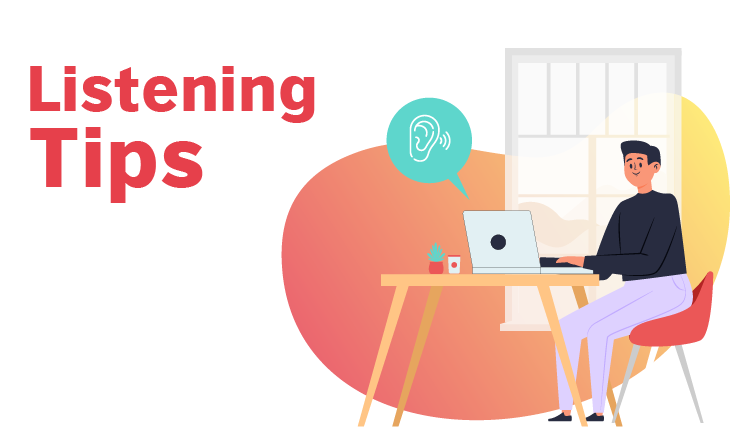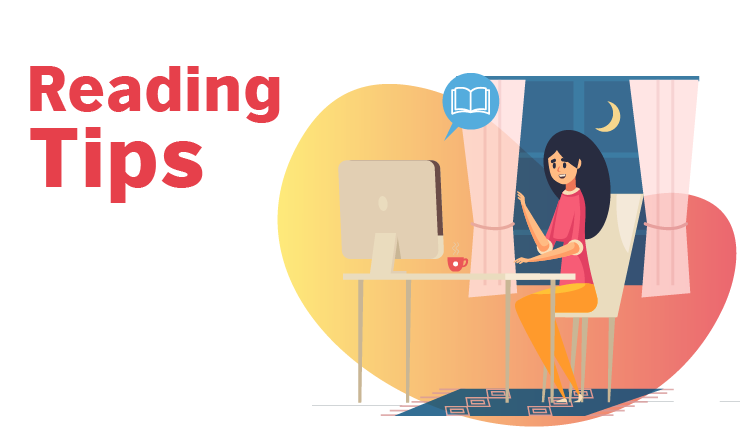Top 20 IELTS Prep Tips you should never miss

Listening Tips
1. Set a realistic goal for yourself and do not aim for shortcuts. Don’t expect to progress from low-level to high-level overnight! Like all skills, becoming proficient in a language takes a lot of time and effort. However, there are many useful strategies you can take:
2. Create a listening routine and stick to it:
(a) Listen to something different every day. For example, on Monday listen to a podcast, on Tuesday – listen to 15 minutes of a news program, on Wednesday – listen to a song, and so on.
(b) Listen to something which interests you!
(c) Choose different sources, like elllo.org. A variety of accents and dialects will help you understand better spoken English from around the world.
(d) Choose listening materials which fit your level. If you can understand <50% and >90% of the audio, then it is not for you as it is either too easy or too difficult. TED talks (https://www.ted.com/talks) are a great way to practice academic listening.
(e) Do it when you are most productive during the day – are you a morning or an evening person?
(f) Plan your listening activities and cross them off once you’ve completed them.
(g) Listen to something a few times; change the speed.
3. Focus on the overall message and do not get frustrated about detail.
4. Take notes while you’re listening and go back to discover what expressions or clues in the audio helped you understand the message.
5. Don’t worry too much about unfamiliar words; if you hear something which is repeated in different sources, look it up in the dictionary and study it.
6. Call a friend and discuss issues in English for a set time period (for example, 10 minutes).
7. Try to guess questions you haven’t answered. This is especially important for “yes”, “no” or “don’t know” questions as the chance of you getting the right answer by chance is pretty high!
8. Before each section you are given time to read the questions. Use this time sensibly and read the questions carefully but not too slowly or the recording will start before you have finished reading.
9. Be sure to answer with the correct number of words. If the question asks for two or three words, don’t use four or five.
10. Write clearly. If the examiner cannot read your writing, then you will get no marks. If you think your writing is bad, use capital letters.
11. During the transferring time first make sure you have transferred all the questions you have answered legibly (easy to read) and in the correct space. Then go back, review and try to answer the ones you haven’t. Make an educated guess, as your aim should be to have an answer sheet with no blank spaces.

Reading tips
1. Choose a variety of texts and combine reading for studying with reading for pleasure.
2. Spend 20-30 minutes every day reading different texts: newspaper articles, blogs, books, textbook activities.
3. Improve your vocabulary by looking up common words (words you hear a lot) in the dictionary.
4. Try different techniques while reading: skim and scan the text quickly, answer questions in detail, summarise the main idea(s).
5. Choose topics of interest but also try to read texts on various topics as IELTS chooses subjects from many fields.
6. Discuss some interesting texts with your friends and exchange ideas in English.
7. Read for speed. Set a timer and try to read a text within the time limit (e.g. 5 mins). Check your understanding. Reduce the time limit as you improve and get faster (e.g. from 5 mins to 4 mins to 3 mins).
8. Read aloud with your friends or even by yourself. You could record yourself if you wish. Listen to how you sound. This will help your fluency and pronunciation. It will also build your self-confidence.
9. Familiarise yourself with the style of the exam and how long each part takes. You need to develop skills to answer each type of question in the reading examination. Questions could take the form of any of the following:
- Multiple choice
- Short answer questions
- Sentence completion questions
- Notes/ table/ form/ summary/ flow chart/diagram completion questions
- Yes, no, not given or True, false, not given
- Classification questions
- Matching
- Choosing headings
- Scanning & identifying location of information
- Labelling a diagram which has numbered parts.
There are many IELTS Practice tests available, which provide examples of the above. Do as many practice tests as you can to get used to the rubric and the task types.
 Home
Home


